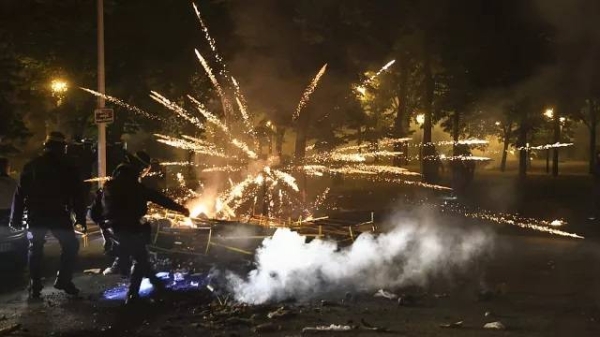
South Africa’s army is to deploy to help police to quell rioting and looting that has cost seven lives and led to hundreds of arrests, military officials have announced.
Authorities have been unable to stem sporadic outbreaks of violence across two provinces since the former president Jacob Zuma handed himself over to police to serve a 15-month prison sentence last week.
Supporters of Zuma looted shops and blocked highways with burning barricades over the weekend. On Monday the breakdown in order appeared to be spreading, with significant numbers of incidents of opportunistic looting reported in large cities including Durban and Johannesburg, the country’s commercial hub.
Police and witnesses described both looters and protesters armed with heavy sticks and there were multiple reports of the use of firearms.
“The South African National Defence Force (SANDF) has commenced with pre-deployment processes and procedures in line with a request for assistance … to assist law enforcement agencies … to quell the unrest that has gripped both provinces in the last few days,” a statement from South Africa’s military said.
“[The army’s] objective is to provide safety and a safe working environment for members of the Saps [South African police service] and other law enforcement agencies whilst they carry out their constitutionally mandated law and order duties.”
The unrest came as a court began hearing Zuma’s challenge to the sentence he received for failing to attend a corruption inquiry.
It has so far been restricted to the former president’s home province of KwaZulu-Natal, and Gauteng.
Television channel eNCA showed footage on Monday of a blaze from the roof of what it said was a mall in Pietermaritzburg, where Zuma, 79, was due to have his legal challenge heard.
Looting was also reported from scores of other places across KwaZulu-Natal, with stores selling alcohol, clothes and electronics targeted.
South Africa’s supreme court sentenced Zuma to 15 months in prison for contempt, after he defied its order to give evidence at an inquiry investigating high-level corruption during his nine years in power until 2018.
It is the first time a former president has been jailed in post-apartheid South Africa and has been seen as a landmark for the rule of law in the troubled country, as well as a victory for the president, Cyril Ramaphosa.
Ramaphosa ousted Zuma, who faced a slew of corruption allegations, in 2018 after taking over the leadership of the ruling African National Congress party the previous year.
The jailing of Zuma will further strengthen the moderate and pragmatic faction of the ruling party, and significantly undermine the entrenched networks within the government and South Africa’s bureaucracy loyal to Zuma, analysts say.
Zuma’s core supporters, echoing the former president’s line, say he is victim of a witch hunt orchestrated by political opponents.
Ramaphosa, a former labour activist and businessman, said on Sunday there was no justification for violence and that it was damaging efforts to rebuild the economy amid the Covid-19 pandemic.
South Africa has been hit by a surge of Covid-19 infections in recent weeks, which have pushed the death toll to more than 70,000, according to official figures. Excess mortality statistics suggest the total is about 170,000. The unrest has forced the closure of clinics, testing stations and vaccination sites, further hampering an already inadequate response to the crisis.
Chemists have also been targeted. A pharmacy distributing free medicine to sufferers of chronic diseases such as HIV and tuberculosis was looted in the disadvantaged neighbourhood of Alexandra in Johannesburg.
Police had earlier sought to reassure the public, saying deployments had been intensified in all the areas hit by the violent protests as the damage to property and looting of stores continued overnight.
Zuma has limited support among South Africans beyond his strongholds in KwaZulu-Natal, and the violent protests are likely to significantly affect any remaining sympathy for the former leader.
An editorial in the Sowetan newspaper said sympathisers of the former president should protest “peacefully without destroying livelihoods”.
“The looting and lawlessness goes against the right to protest and those responsible must be arrested and face the might of the law,” said Shenilla Mohamed, Amnesty South Africa’s executive director.
In the virtual hearing on Monday morning, Zuma’s lawyers asked the court to rescind his prison sentence, relying on a rule that judgments can be reconsidered if made in the absence of the affected person or containing a patent error.
Legal experts say their chances of success are slim.
The corruption inquiry is examining allegations that he allowed three Indian-born businessmen to plunder state resources and peddle influence over government policy. He and the Gupta brothers, who fled after his resignation and are believed to be living in Dubai, deny wrongdoing.
Zuma also faces a corruption case relating to a $2bn (£1.4bn) arms deal in 1999 when he was deputy president. He denies the charges in that case.












